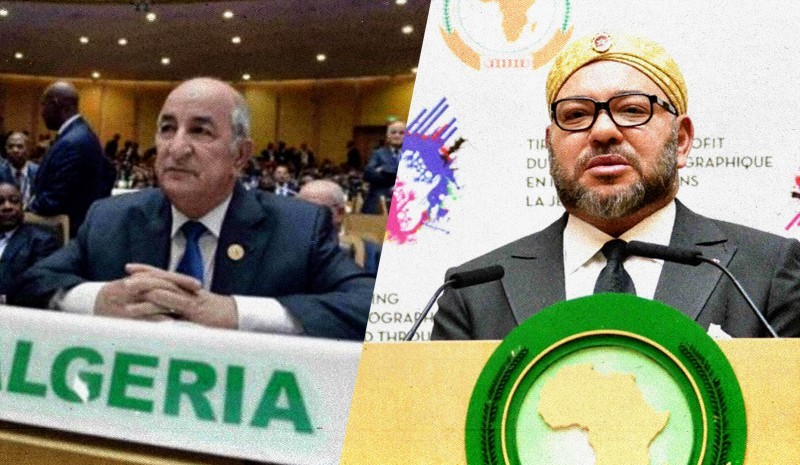
Under German Eyes: Unwarranted Assumptions on the Maghreb’s Geo-Strategic Relations with Sub-Saharan Africa
Tensions between Algeria and Morocco predate the sucess of Morocco's diplomacy in sub-Saharan Africa.
Isabelle Werenfels, a senior fellow in the Middle East and Africa Division of the Berlin-based Stiftung Wissenschaft und Politik (the German Institute for International and Security Affairs) published recently a short “study” titled “Maghrebi Rivalries Over Sub‑Saharan Africa: Algeria and Tunisia Seeking to Keep Up with Morocco.” The supposed “study” is at best a white paper, not even a policy note, although some of its parts aspire to be so.
It has no references at all and lacks scholarly rigor, not showing in any way how it’s different assumptions are warranted by facts or publications or political statements. Nonetheless, it is worth considering it as it gives us a sense of how some German think tanks view the Maghreb’s relations with sub-Saharan countries, as these opinions most probably inform decision-making processes in Berlin, especially at a moment when Germany is aspiring to play an emergent role in geostrategic affairs.
The paper provides interesting comparisons between the sub-Saharan Africa policies of Morocco, Algeria and Tunisia, but it makes wildly unsubstantiated assumptions and therefore useless policy recommendations. It states that “Morocco is the Maghreb state with the most sophisticated sub-Sahara policy” but its “Sub-Sahara policy has heightened tensions with Algeria and awakened ambitions in Tunisia.”
Tensions between Morocco and Algeria were higher in the past when diplomatic relations were cut off and both armies confronted each other in Western Sahara in the late seventies of the 20th century. Tensions are high nowadays over Western Sahara but only secondarily over Morocco’s Africa strategy. It is true that Algiers is wary of Morocco’s successes in Africa, but its leaders seem to be confident Algeria could catch up any time soon, especially if oil prices go up, and if it could capitalize on its strategic alliances with South Africa, Nigeria, Ethiopia and Angola.
The policy recommendation of Isabelle Werenfelsis in this regard is as wild as the central thesis: “The European Union should treat these trends as an opportunity for African integration and triangular EU/Maghreb/Sub-Sahara cooperation. This could counteract Algeria’s feeling of growing irrelevance, strengthen Tunisia’s economy, put Morocco’s hegemonic ambitions in perspective, and thus mitigate the negative dynamics of the rivalry.”
The author does not provide any evidence for “Algeria’s feeling of growing irrelevance.”
Meanwhile, as one 2017 report put it, “From the statements of its political leaders, it seems that Algeria thinks it is at the heart of things African, both economically and politically. The feeling of irrelevance on the part of Algerians may be a good theory that could explain the ex-Minister of Foreign Affairs’ (Abdelkader Messahel) attacks on Morocco’s successes in Africa on October 20th, 2017.”
But the same Messahel stated at the same event (the Summer University Forum of Algerian Business Leaders) that Algeria is a story of incomparable economic successes in Africa. It would have been useful if Isabelle Werenfels was intellectually and academically generous enough to tell us how she did arrive at this conclusion, on what basis, what sources, documents or classified or declassified information.
The wildest of all assumptions is “Morocco’s hegemonic ambitions.” The author surreptitiously mentions “Morocco’s hegemony” in the introduction but never goes back to it in the body of the text to provide evidence. The supposed hegemony of Morocco is a recurrent theme in Algeria’s opposition to Morocco’s anti-colonial efforts in Western Sahara.
Because France cut a big chunk of Morocco’s Eastern Sahara region in 1955 and kept it under French control, hoping to stay in Algeria forever, Algeria is always scared that Morocco could start claiming back Eastern Sahara once it solidifies its sovereignty over Western Sahara. Hence its depiction of Morocco’s desire to complete its territorial integrity as expansionist or hegemonic.
The Spanish extreme right buys that theory as well, especially when Morocco claims that Ceuta and Melilla are Moroccan cities occupied by Spain since the 16th century. To translate Moroccan anti-colonial efforts as “hegemonic”, on the part of Isabelle Werenfels, smacks not only of proto-colonialism but of a perverted logic of reversing roles so that victims become bullies.
Because this is a recurrent Algerian accusation and when juxtaposed to Algeria’s alleged feeling of irrelevance (a non-scholarly touchy-feeling statement), it becomes clear that Isabelle Werenfels is sensitive to Algiers’ point of view. There is nothing wrong or sinful with being pro-Algerian or having a soft point for things Algerian (here is Isabelle Werenfels’s Twitter title banner: “Works on the #Maghreb @SWP_MEA. Has a very weak spot for #Algeria”).
Retweets are not necessarily endorsement, but academic norms and scholarly standards, both very well ingrained in a long German tradition of rigorous and objective research, should be observed when making claims of this nature, especially when we know that they could influence decision makers.
As I said above, in the absence of references and facts, the document is nothing but a working white paper not worthy of publication by a serious organization like the Stiftung Wissenschaft und Politik. Some Moroccan newspapers called it, mockingly, “a call for Morocco to halt its African policy for Algeria to catch up with it.” I would call it “a desperate appeal from a pro-Algerian author to the EU to stop Morocco from outstripping its neighbors in its Africa policy.” A bizarre call, for sure. But what can’t you do for your soft spots, even when you are a scholar?
Source: Morocco World News.
